
The Impact of Building Codes and Regulations on Real Estate Development
Building codes and regulations are an essential part of real estate development. They are designed to ensure that buildings are safe, healthy, and sustainable. These codes and regulations are enforced by local and state governments to protect the public and the environment. In this article, we will explore the impact of building codes and regulations on real estate development in the United States.
What are Building Codes?
Building codes are a set of regulations that govern the design, construction, and maintenance of buildings. These codes are developed by local and state governments to ensure that buildings are safe, healthy, and sustainable. Building codes cover a wide range of topics, including structural design, fire safety, plumbing, electrical systems, and energy efficiency.
Building codes are enforced by local building departments, which are responsible for issuing building permits, inspecting construction sites, and ensuring that buildings comply with the codes. Building codes are updated regularly to reflect changes in technology, materials, and construction practices.
Why are Building Codes Important?
Building codes are important for several reasons. First, they ensure that buildings are safe for occupants. Building codes require that buildings be designed and constructed to withstand natural disasters, such as earthquakes and hurricanes. They also require that buildings be equipped with fire suppression systems and emergency exits to protect occupants in the event of a fire.
Second, building codes promote sustainability. Building codes require that buildings be designed and constructed to be energy-efficient, which reduces the amount of energy needed to heat and cool the building. This reduces the building’s carbon footprint and helps to mitigate climate change.
Finally, building codes protect the environment. Building codes require that buildings be constructed in a way that minimizes their impact on the environment. For example, building codes require that buildings be designed to reduce stormwater runoff, which can pollute waterways and harm aquatic life.
How do Building Codes Impact Real Estate Development?
Building codes have a significant impact on real estate development. They can affect the cost, design, and timeline of a project. Building codes can also affect the marketability of a property.
Building codes can increase the cost of a project. Building codes require that buildings be designed and constructed to meet certain standards, which can increase the cost of materials and labor. For example, building codes may require that buildings be constructed with fire-resistant materials, which can be more expensive than traditional building materials.
Building codes can also affect the design of a project. Building codes may require that buildings be designed in a certain way to meet safety or sustainability standards. For example, building codes may require that buildings be designed to withstand earthquakes, which can affect the layout and design of the building.
Building codes can also affect the timeline of a project. Building codes require that buildings be inspected at various stages of construction, which can cause delays in the construction process. For example, if an inspector finds a problem during an inspection, the problem must be fixed before construction can continue.
Finally, building codes can affect the marketability of a property. Buildings that are designed and constructed to meet building codes are more attractive to buyers and renters. Buildings that do not meet building codes may be difficult to sell or rent.
Conclusion
Building codes and regulations are an essential part of real estate development. They ensure that buildings are safe, healthy, and sustainable. Building codes have a significant impact on real estate development, affecting the cost, design, timeline, and marketability of a project. It is important for real estate developers to understand building codes and regulations to ensure that their projects are successful and comply with the law.
FAQs
What are some common building codes?
Some common building codes include the International Building Code (IBC), the International Residential Code (IRC), and the National Electrical Code (NEC).
Who enforces building codes?
Building codes are enforced by local building departments, which are responsible for issuing building permits, inspecting construction sites, and ensuring that buildings comply with the codes.
What happens if a building does not meet building codes?
If a building does not meet building codes, the owner may be fined or required to make changes to the building to bring it into compliance with the codes.